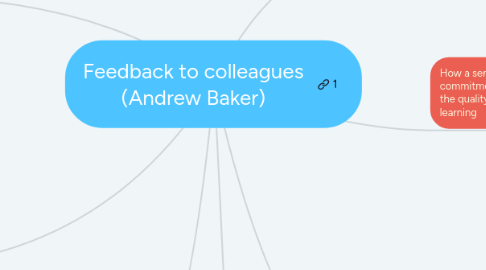Feedback to colleagues (Andrew Baker)
by maximiliano sainez


1. Delivering “hard” messages to colleagues
1.1. Teachers needed a “clear lead” on a “particular way of doing things”. On other occasions, a coaching approach could be adopted where it was not simply a case of “an observer passing on their wisdom”
2. Developing the skills of middle leaders.
2.1. Schools identify teachers who have particular strengths and, for a development activity, other teachers observe them teaching.
3. Practical advice for those responsible for improving curriculum delivery.
3.1. As an end note, Andrew commented that one of the key elements of the success of developing observational and feedback skills within his school was that it relied on colleagues in the school and had the power of “working with people that you know and respect”.
4. CONCLUSION
4.1. Feedback is a very important part because we can observe the mistakes we make and also to be able to correct them and also to observe our own mistakes. we need a series of rules and instructions to be able to give good feedback
5. The importance of feedback
5.1. Feedback constitutes a highly practical method for a senior leader to monitor the implementation, at classroom level, of the school’s priorities in its development plan.
6. How a senior leader can secure commitment to improving the quality of teaching and learning
6.1. Andrew recognised the fact that teachers might be sensitive to being observed in the classroom but commented that because the common pattern now was for teachers to plan and teach collaboratively, there was less evidence of “teaching in isolation” behind closed classroom doors.
7. FEEDBACK ON TEACHING
7.1. As an observer giving feedback.
7.1.1. Focus on behaviours, not the individual.
7.1.2. Be specific.
7.1.3. Be positive and constructive...and honest!
7.1.4. Check your ego at the door.
7.1.5. Offer options and alternatives.
7.1.6. Avoid prescriptive language.
7.1.7. Don’t demand unreasonable change.
7.1.8. Be concise.
7.2. As the teacher receiving feedback...
7.2.1. Be sincerely open to all comments.
7.2.2. Avoid being defensive.
7.2.3. Specify the feedback you’re looking for.
7.2.4. Confirm your understanding of the feedbackprovided.
7.2.5. Share your reaction to the feedback.

